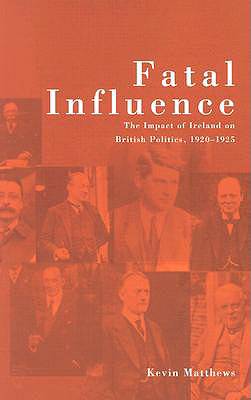
Bedankt voor het vertrouwen het afgelopen jaar! Om jou te bedanken bieden we GRATIS verzending (in België) aan op alles gedurende de hele maand januari.
- Afhalen na 1 uur in een winkel met voorraad
- In januari gratis thuislevering in België
- Ruim aanbod met 7 miljoen producten
Bedankt voor het vertrouwen het afgelopen jaar! Om jou te bedanken bieden we GRATIS verzending (in België) aan op alles gedurende de hele maand januari.
- Afhalen na 1 uur in een winkel met voorraad
- In januari gratis thuislevering in België
- Ruim aanbod met 7 miljoen producten
Zoeken
Fatal Influence
The Impact of Ireland on British Politics, 1920-1925
Kevin Matthews
Paperback | Engels
€ 40,45
+ 80 punten
Uitvoering
Omschrijving
"Fatal Influence" challenges and revises many widely held assumptions about a pivotal moment in both British and Irish history and persuasively demonstrates that Ireland's impact on British politics lasted far longer and was far greater than has been realized. Kevin Matthews places the settlement of the Irish Question in the 1920s within the broader context of a revolution then taking place in British politics and shows how each affected the other. In a detailed investigation, he explores the Irish partition and the often conflicting motives that led to this momentous decision. Far from solving the Irish Question, dividing the country into two parts merely created what one politician at the time called its "elements of dynamite". These explosive elements were thrown into an already unstable political situation in Britain, with three political parties - Liberals, Conservatives, and Labour - all vying for a place in that nation's traditional two-party system. The book brings together some of the most colourful characters of 20th-century British and Irish history, from Winston Churchill and Michael Collins to David Lloyd George and Eamon de Valera.Looming behind is Sir James Craig, the rock-like embodiment of Ulster Unionism. But this story of "high politics" also involves men whose careers are not normally associated with the Irish conflict, figures such as Stanley Baldwin, Ramsay MacDonald, Neville Chamberlain and, even, Oswald Mosley and Anthony Eden.
Specificaties
Betrokkenen
- Auteur(s):
- Uitgeverij:
Inhoud
- Aantal bladzijden:
- 317
- Taal:
- Engels
Eigenschappen
- Productcode (EAN):
- 9781904558057
- Verschijningsdatum:
- 14/02/2004
- Uitvoering:
- Paperback
- Formaat:
- Trade paperback (VS)
- Afmetingen:
- 154 mm x 231 mm
- Gewicht:
- 607 g

Alleen bij Standaard Boekhandel
+ 80 punten op je klantenkaart van Standaard Boekhandel
Beoordelingen
We publiceren alleen reviews die voldoen aan de voorwaarden voor reviews. Bekijk onze voorwaarden voor reviews.









